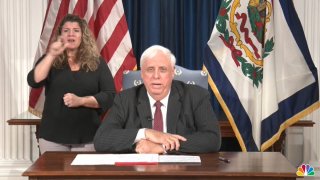
Gov. Jim Justice rescheduled West Virginia's May 12 primary election to June 9 on Wednesday, citing fears about the coronavirusspreading at polling places.
Justice said medical experts told him that having the primary on its originally scheduled date would be unsafe for voters and poll workers, since health officials have warned of a surge in the coming weeks.
“There is no question moving this date is the right thing to do,” said Justice, a Republican.
Justice said he had wanted to preserve the May primary date, but he has been “bombarded” with requests to postpone the election. He said the new June date will result in fewer people at polling places since it falls after the school year.
We're making it easier for you to find stories that matter with our new newsletter — The 4Front. Sign up here and get news that is important for you to your inbox.
Secretary of State Mac Warner has said he mailed absentee ballot applications to registered voters in a bid to encourage mail-in voting. The applications should arrive during the first week of April, according to Warner. He said deadlines on those applications, as well as the early voting period, will be extended.
Multiple states including Ohio, Louisiana, Georgia, Kentucky, Indiana and Maryland have pushed back election dates. Alabama has also moved a GOP primary runoff from March to July.
Also on Wednesday, Justice extended a statewide schools closures until at least April 30, though he said he remains hopeful schools will reopen at some point this year.
Health
Meanwhile, Attorney General Patrick Morrisey said an executive order banning elective medical procedures also prohibits abortions. Similar moves have been struck down by federal judges some other states after legal challenges. Morrisey made the announcement without taking questions.
West Virginia's coronavirus caseload rose to at least 191 people after 4,575 tests, state health officials said Wednesday. The state has reported two virus fatalities, an 88-year-old Marion County woman and a Jackson County resident with several underlying health issues.
West Virginia was the last U.S. state to report a confirmed case, though Justice attributed that to a lack of testing. Testing remains limited, meaning most people now spreading the highly contagious virus may not know they have been infected, and state health officials have admitted their count lags behind the actual total as results pour in from counties around the state.
Justice has previously declared a state of emergency, ordered all non-essential businesses to close and issued a stay-home order . He also mandated that people entering the state from places hard-hit by the virus must quarantine for two weeks or face an obstruction charge, and said authorities will watch roads and conduct home checks to make sure people comply.
The directive triggered constitutional concerns almost immediately, with the state American Civil Liberties Union calling it an overly broad move that could trigger unreasonable searches and seizures. Justice on Tuesday acknowledged that his directive might be unconstitutionalbut said it would continue nonetheless.
For most people, the new coronavirus causes mild or moderate symptoms, such as fever and cough that clear up in two to three weeks, and the overwhelming majority of people recover. But severe cases can need respirators to survive, and with infections spreading exponentially, hospitals across the country are either bracing for a coming wave of patients, or already struggling to keep up.
___
Follow AP coverage of the virus outbreak at https://apnews.com/VirusOutbreak and https://apnews.com/UnderstandingtheOutbreak.



